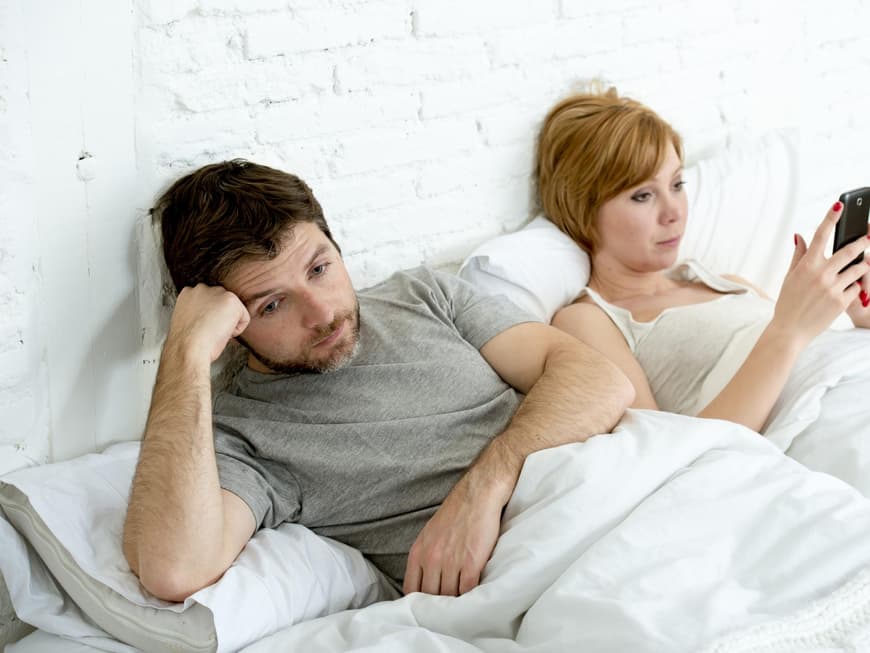
And if you really don't want to deal with yourself, you could take the drug Flibanserin. After all, it's supposed to make you feel like it. However, it is only available for women. Why is that? I haven't even come across this question yet. Flibanserin cannot be equated with drugs such as Viagra or Cialis due to a completely different mode of action. This is because the so-called PDE-5 inhibitors are all about the erection. And this only occurs when desire is already present.
But men also suffer from a lack of desire. Couldn't they then also take flibanserin? I'll make a note of that under "Open questions". Unfortunately or fortunately, it's not that simple anyway. Because there are as many ways into listlessness as there are ways to Rome. And there are ways out.
The dear hormones
The first thing that often comes to mind is a hormone deficiency. Too little oestrogen, too little testosterone. And this can actually be a cause. Hormonal contraceptives such as the pill or the IUD, for example, can affect desire. The decline in oestrogen after the menopause can also have an effect on desire. However, some women report an increased libido. This in turn cannot be explained by the decline in hormones and may be related to the fact that the fear of unwanted conception no longer blocks desire. After pregnancies, there is also often a difference in desire potential in a relationship. However, this can also usually be explained by the circumstances.
In men, testosterone levels fall with increasing age. It is assumed that this can also lead to a reduction in desire. However, this has not (yet) been proven.* Overall, male listlessness is still a taboo subject and has not been scientifically investigated in the same way as female listlessness. In addition to hormones, there is also a whole range of diseases such as
- diabetes
- depression
- addictions
- cardiovascular diseases
- high blood pressure
- and the associated intake of certain medications that affect desire.
For the sake of completeness, I would also like to mention excessive alcohol consumption or drug use.
-> All of this should be clarified with a doctor.
Stressful life circumstances
However, there are often completely different causes behind it when we suddenly or gradually lose our desire for sex. Stress is right at the top of the list. Job and family place high demands on us. Precarious working conditions and financial worries keep us mentally on our toes. What's more, we are constantly available everywhere, focused on performance and always on the go. How can we switch off and listen to our inner voice? Am I missing something? Who is on the phone right now? Could the children burst into the bedroom? Can the in-laws hear us?
-> How about taking some time out? Get away from everyday life. And not just an active vacation where you spend the whole day doing something else. No, take time for yourself as a couple. Take time to talk, to do something together, to exchange ideas.
-> You can also see if you can change something about the normal madness of everyday life. Do relaxation methods such as meditation or progressive muscle relaxation according to Jacobsen help to reduce energy levels? Is there the possibility of additional childcare or household help? Can stress at work be reduced?
High expectations of the partnership
A partnership can mean support, well-being and love. But it doesn't have to. The high divorce rates indicate that there is great potential for conflict here. And if there are serious disagreements between partners, if you don't feel like you're in good hands or are perhaps even put under pressure, then pleasure is a rare commodity. There are often high and false expectations of the partner, but also of sexuality. Women in particular often think that their partner should know what is good for them. If things don't work out in bed, it's due to their partner's lack of empathy, but not their own expectations.
This also has to do with the fact that women are less likely to learn to make demands and then wait passively for them to be met anyway. This in turn puts men under pressure. They know that they should do something. But they don't know exactly what. That doesn't promote pleasure either, just like bad sex. So it's a downward spiral. The lovemaking is not really satisfying for either of them. If intercourse is then carried out despite a lack of arousal, this can in turn lead to pain during sex. Pleasure? No chance.
-> The aim here is to reduce the pressure to perform and resolve conflicts in the relationship. This cannot be done on the side. A couple needs time and possibly support.
Your own beliefs
An upbringing that is hostile to pleasure, bad experiences and a simple lack of knowledge about our own body and sexual reactions can also contribute to the fact that pleasure does not arise in the first place or that we are not aware of it.
What sexologist Meredith Chivers found out in her studies across the United States is fascinating: Women have much more desire than they themselves even realize. She measured the blood flow to the genitals while showing the test subjects very different sexually charged images. The head said "No, I'm not interested in that at all." The body, on the other hand, showed something completely different. It was definitely aroused. This makes it clear how strong our inner censorship is. So strong that we don't even come into contact with our desire.
It's not easy to come to terms with your own beliefs and ideals. But it is worth it. Because some of these things have been with us since we were babies:
-> What image of sexuality was I taught?
-> Who influenced me sexually?
-> What commandments and prohibitions have an effect on me? What taboos and myths influence me?
-> What do I think "real" sexuality should be like?
It also makes sense to get to grips with your body and learn to play with your own lust.
-> What actually turns me on?
-> How can I evoke pleasurable feelings?
-> How can I increase them myself?
-> How can I use my pelvic floor muscles and my breathing?
As you can see, there are plenty of ways to counteract listlessness.
Anja Drews - qualified sex educator for ORION






